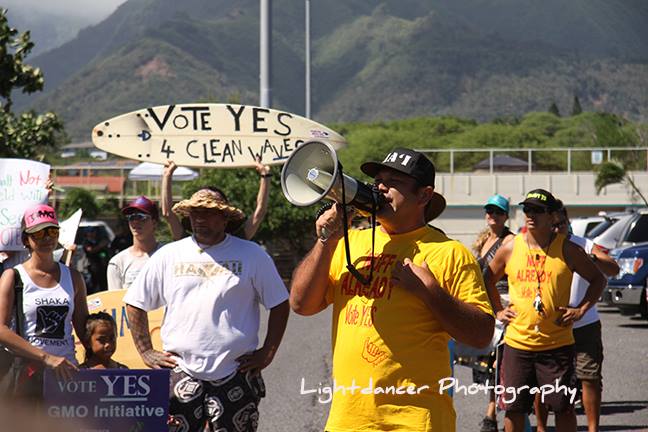, Yet Lose to Citizen’s Groups; Companies Vow to Fight GMO Moratorium
Citizen’s groups in Maui County, including The SHAKA Movement, stood up to two of the most influential Agro-chemical corporations, Monsanto and Mycogen (Dow AgroSciences), and won the most highly financed political campaign in the history of Hawaii. (1) The results are the strongest local GMO restrictions in the nation, a temporary ban on all GM crop production and experimentation till studies show no harm.
Wailuku, Maui (PRWEB) November 09, 2014

Calling themselves the “Citizens Against the Maui County Farming Ban,” but funded almost exclusively by the Agro Chemical companies (Monsanto 5.1 Million, Dow/Mycogen 1.8 Million), the anti-moratorium group reported raising nearly $8 million dollars through Oct 20. (10) Numbers for the last two weeks of the campaign are, as of yet, unreported.
The corporate giants’ spending dwarfs all previous Hawaii political campaigns. Dubbed the most expensive local initiative in the country by the Center for Public Integrity, this amounts to $362 for every vote earned. (2)(3)
![]() “To Monsanto and Dow, Please stop using our local farmers as pawns in your advertising campaign.” Alika Atay, President of the Hawaiian Indigenous Natural Farming Association
“To Monsanto and Dow, Please stop using our local farmers as pawns in your advertising campaign.” Alika Atay, President of the Hawaiian Indigenous Natural Farming Association![]()
The companies outspent nearly 100 to 1 the community based SHAKA Movement (Sustainable Hawaiian Agriculture for the Keiki and the ‘Aina) and Maui Citizens for a Temporary Moratorium on GMO Crops, which together raised under $90,000 (10).
Still, voters here approved the County’s first-ever Citizens Initiative, a temporary moratorium on the cultivation of genetically engineered crops until Environmental and Public Health Impacts Study (EPHIS) are conducted and the industry’s practices and operations are found to not cause harm to the environment and/or the people of Maui County. (1)
Residents concerned with the expanding GMO fields upwind from homes and schools and the potential heath risks from exposure to the growing use of pesticide combinations associated with the production of GMO seed crops, as well as open-air chemical experiments, gathered 9,062 valid petition signatures to get the successful citizen’s initiative on the November ballot. (13)
Local Climate/Global Implications: Quietly, over the years, the Agro Chemical companies have moved into Maui County where the three to four growing cycles per year dramatically expedite their research and development of new varieties of genetically engineered corn and other crops.(4)
As pineapple and sugar cane production has declined, corn seed production in Hawaii has grown to be worth $217 million, as of 2012, the most recent data available. (5) Monsanto’s and Mycogen’s GMO seed operation has grown to occupy 3,500 acres on Maui and Molokai.(7)
The Agro Chemical companies flooded the community with all forms of advertising. In their ads, the group called the initiative a “Farming Ban” and claimed the moratorium would cause the loss of hundreds of jobs and devastate the county’s economy.
Hundreds of Maui residents worked to counter pro-GMO advertising with grassroots outreach to share their concerns about seed companies’ practices. They also created their own ads featuring local farmers to debunk the company’s claims. (8)
According to Mr. Evan Ryan, owner of Pono Grown Farm Center and past board member of the Maui Farmers Union United, “The GMO initiative asks for a temporary suspension of GMO crops while health and environmental impact studies can be conducted. There is no farming ban.”
Mr. Ipo Mokiao, a traditional Hawaiian nature farmer said: “This bill affects the chemical companies doing GMO’s. That’s just 1 percent of all farming operations in Maui County. They paid for those ads.”
And Mr. Alika Atay, President of the Hawaiian Indigenous Natural Farming Association and one of the five Maui citizens who sponsored the initiative, spoke to the companies directly: ”Please stop using our local farmers as pawns in your advertising campaign.”
Despite the Industry’s advertising, or perhaps because of the extent of it, the grassroots movement persevered and won the election.
Hawaii State Representative Mr. Kaniela Ing observed in an interview broadcast by Hawaii News Now: “I think what changed the game was when the campaign disclosure came out and (people) realized that $8 million was spent by just two companies to affect this. I think the people spoke out loud and clear that that has no place on Maui.” (9)
By comparison, two of the grassroots organizations supporting the initiative, the SHAKA Movement (Sustainable Hawaiian Agriculture for the Keiki and the ‘Aina) and Maui Citizens for a Temporary Moratorium on GMO Crops, raised and spent a total of just under $90,000, (10) primarily through a crowd funding campaign with donations averaging about $50 each.
One day after a historic citizens initiative calling for a moratorium on the cultivation of all genetically engineered crops in Maui County passed, in a statement, John P. Purcell, vice president of Monsanto Hawaii Business, said the company intends to challenge the ordinance.(6)
What’s at stake is whether corporations can “come in here and run our island as a chemical experiment where they ship out the profits and we have to deal with the pollutants,” said Mark Sheehan, and a long-time Maui environmentalist and one of the five citizens who sponsored the initiative. (4) “Regardless of the final outcome of the company’s coming maneuvers, the issues of corporate profits as a trade off for public and environmental heath is not going to go away.”
“For the first time in 20 years travelers did not select Maui as the number one island destination in the world. (11) It’s no coincidence that also for the first time ‘NON GMO’ beat out ‘ORGANIC’ as the pivotal feature for purchasing decisions by consumers concerned with heath and sustainability,” (12) said Sheehan. “Why should our far larger tourist industry be out at risk from GMO’s and expanding pesticide use for the benefit of just two Agro Chemical companies? The SHAKA Movement is working to help create healthy Ag and non-Ag jobs as an alternative for GMO farm workers. Now the high profile maneuvers the companies promise will only do more harm to our tourism making that harder to do. Why not put all the money they are wasting towards doing the reasonable studies instead and we can all move on safely and sustainably?”
Sheehan adds: “The SHAKA Movement looks forward to working with the County to heal the divisions created by all the propaganda and misinformation pumped into our community and to creating a sustainable agricultural system that emphasizes local food security over exports for profits. This initiative was an important first step for us all to find a new way of self-governing, where when the people lead, the leaders shall follow. In the coming months, as the truth of the chemical industry’s over $8 million dollar advertising campaign is revealed, the people will rise up in even greater solidarity to protect our children and our environment. We give thanks for all who have come before us and to the many citizen volunteers who worked tirelessly to make this day happen.


Leave a Reply
You must be logged in to post a comment.